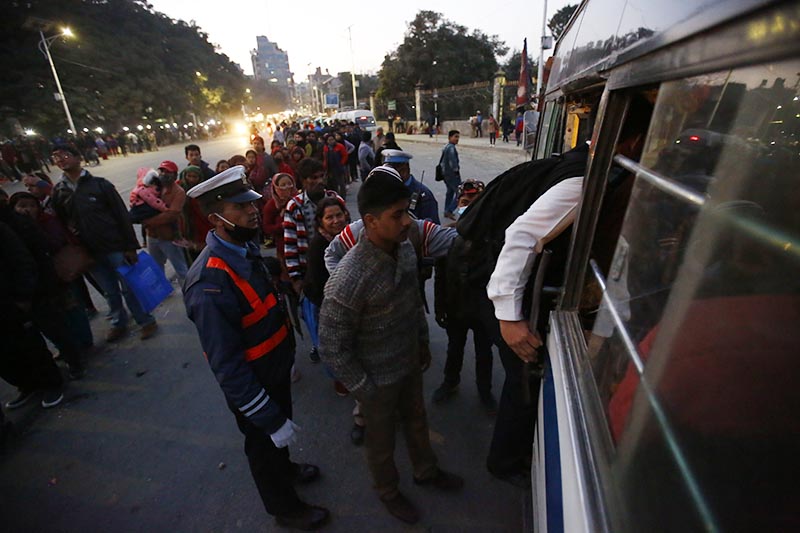Cops to get passengers to queue up at bus stations
Kathmandu, December 17
Traffic police have launched a special campaign to ensure that all passengers get opportunity to travel on public transport without facing any hassle.
For this, Metropolitan Traffic Police Division, in association with volunteers, will cause the passengers to stand in queue at certain stations to board bus, minibus and microbus. DIG Sarbendra Khanal, MPTD in-charge, said the queue system was started at boarding points, including Samakhusi, Khusibu, Maharajgunj, Gaushala, Chabahil, New Baneshwor, Koteshwor, Kupandol, Sundhara and Thimi today.
“It is also part of our awareness-raising campaign to lessen the trouble being caused to passengers, especially women and elderly. The queue system allows passengers to board bus on first-come-first-served basis with special priority to women and the elderly. Males and females will have separate queues,” he informed.
According to MTPD, it is a week-long campaign and will be effective during peak hours in the morning and evening in 10 places. DIG Khanal said all traffic units in the Valley were also directed to make such arrangements in the areas falling under their domain.
The queue system will be applicable from 9:00am to 11:00am in Maharajgunj, from 10:00am to 12:00pm in other stations, and from 4:00pm to 6:00pm in all places. “This initiative was launched after women, children, the elderly and the differently-abled complained of difficulties they faced while boarding bus despite hours of wait,” he reasoned.
Meanwhile, Metropolitan Police Office has launched ‘Safety Booth’ programme to discourage sexual harassment on public transport. The booth set up in New Thimi, Imadol, Chapagaun, Farping, Ratna Park, Chabahil and Balkhu distributes pamphlets to the passengers and paste awareness stickers on public vehicles.
According to police, many women and teenagers using public transport face sexual harassment. But most of the cases go unreported. Public vehicles in Kathmandu Valley are usually overcrowded, providing the molesters with ample opportunity to sexually harass women. Tens of thousands of people use public vehicles daily. Existing laws define sexual assault as any form of sexual contact or activity like touching, tapping and showing sexually explicit pictures or movies without one’s consent.
According to a 2013 World Bank survey, 26 per cent of female respondents aged between 19 and 35 years said they had experienced some form of sexual harassment on public transport in Nepal. The main perpetrators are mostly middle-aged men and more than half of all the women who were surveyed said they avoided standing or sitting next to a middle-aged man while travelling on a public vehicle.






